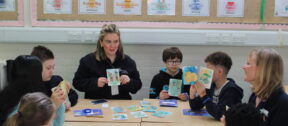Breaking the grip of addiction
Any parent or carer for a child will go to great lengths to protect that young person from illness and injury. Finding out that your child is in the grip of addiction can come as a shock and leaves families unprepared for the consequences. Parents often find that they blame themselves or each other for a child’s substance abuse – which doesn’t help anyone.
Addictions arise when emotional needs are unmet – including the need to feel safe and secure; to feel in control of our lives; to feel emotionally connected to others; to give and receive attention; to feel we belong to the wider community; to have privacy and time to relax and reflect; to feel that we are stretched and challenged; and to feel that life has meaning and purpose.
So if a young person doesn’t feel that they are getting to grips with social skills they may struggle to meet needs for emotional connection and feel socially awkward or excluded. If using cannabis provides a shortcut to reducing these feelings, and a way to escape from social pressures, then this can give rise to a dependency on cannabis use.
Likewise, if a person feels more confident after drinking alcohol and their inhibitions are lowered, they can come to depend upon alcohol in social situations. Substances like alcohol and cannabis also slow down the body and mind, providing an easy way to get control over feelings of stress, anxiety and distressing thoughts and memories.
A young person may be worried about exams, or that they are missing skills which seem to come easily to others. But if playing games consoles is something they are good at, and also a distraction from worrying, they might become addicted to the quick rewards which are built into the design of games – scoring points, completing levels and so on.
Much addictive behaviour starts when we first begin to experiment with activities which are ‘off limits’ until we reach a legal age – drinking, smoking, having sex and gambling, for example. Because we are likely to experiment with our peers, drinking, smoking, or recreational drug use can become ‘rites of passage’, and a part meeting the need to belong to groups.
So what can parents do to support children and young people with recovery from addiction? The first thing we need to do is to see the addiction as the enemy and avoid causing a young person to feel judged or ashamed. Shame and guilt can destroy the motivation for change which a young person needs to beat addiction.
Willpower alone is never enough to overcome cravings, so when they are ready to do so, we should encourage people to seek help with planning for the risk of relapse and resolving unaddressed traumas which might underpin addiction.
Addictions lie to us, hijacking motivation by promising us the reward of pleasurable feelings for getting needs met – as well as relief from the pain of stressful feelings and withdrawal. Because addictions are unhealthy attempts to meet emotional needs, beating an addiction needs a change in lifestyle to support getting needs met in healthier ways – and parents can encourage and support these changes.
A healthier lifestyle might involve spending time with friends and building social networks with people who don’t share the addictive behaviour; building self-esteem through practising hobbies or studying; learning social skills or how to manage feelings with relaxation exercises. Gaining employment or healthier relationships can often tip the balance away from addiction towards recovery, and a life that works to meet needs in healthy ways.














